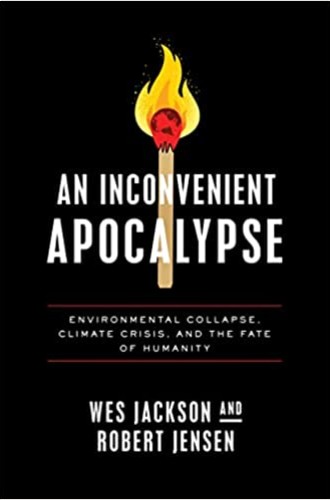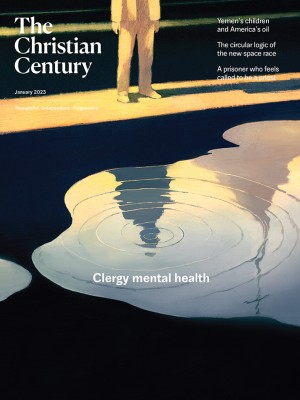After growth
Wes Jackson and Robert Jensen argue that we need to live with less stuff—and way less people.
Who are humans? We are consumers and entrepreneurs, and we are formed as such by our neoliberal capitalist culture, writes philosopher Todd May in Friendship in an Age of Economics. The consumer consumes, living in the eternal hedonistic present, with little thought for the past or future. The entrepreneur seeks, maximizing current investments in people, things, and experiences, always with an eye for future gains. Both figures are the result of a rampant capitalistic perspective that places our lives within the paradigm of the marketplace.
In An Inconvenient Apocalypse, Wes Jackson and Robert Jensen also ask the question, Who are we? Their answer is similar to May’s: we are consumers and seekers. But for them, we are seeking and consuming one grand, simple thing: carbon.
Read our latest issue or browse back issues.
Our outsized consumption of carbon has brought civilization as we know it to the brink of an imminent apocalypse, the authors warn. “It is our human nature, like the nature of all life, to seek out energy-rich carbon,” Jackson and Jensen write. We have gotten “exceedingly good” at it, too good. Acquiring more carbon than we need, humans have inflicted rounds of destructive activities on the ecosphere that have only increased in number and devastation with capitalism’s global entrenchment.
We “have lived in a culture that assumed expansion,” but progress is not limitless. In the face of an increasing number of ecological and ideological crises, “the old future is gone,” Jackson and Jensen write. In its place is a new vision—one of contraction.
Reduction is never popular, as any politician knows. Although scientists have long noted the ecological damage we are provoking, society has done little to change course. Instead, a religion of technological fundamentalism replaces the hard truth of impending climate collapse with the easy belief that technology will save us. The authors see this confidence in technological solutions as a “religious-style faith in the ability of societies to solve problems with high energy and high technology.”
Like a highway billboard, it offers easy answers, but its hope is false. Technology will not save. It is why we are in this mess, according to Jackson and Jensen. The origins of our current climate crisis began 10,000 years ago with the advent of our greatest technology, agriculture. It was at that point that we were able to extract more value from the land than it could sustainably give, reducing soil quality and increasing erosion. Once agriculture was established, humans burned forests to smelt ore in the Bronze and Iron Ages and later extracted and burned coal, oil, and natural gas, taking us into the Industrial and Digital Ages.
The inconvenience named in the book’s title is that we have reached the end of these extracting activities and a new way forward will be anything but convenient. “Fewer people and less stuff” is Jackson and Jensen’s apocalyptic solution. A return to smaller, more sustainable communities, as well as a more equitable distribution of resources, will be our saving grace. We must provide for needs only and not wants. And we must reduce our human population by at least two-thirds in order to stay within the limits of our carrying capacity. Jackson and Jensen do not address how a reduction of this sort could be humanely and justly accomplished, but they imply that it may happen on its own due to climate collapse.
Christian language frames the book, although both authors are secularists who use terms such as prophetic and saving remnant symbolically rather than theologically. Jackson is the cofounder of the Land Institute in Salina, Kansas, and spent the majority of his career on agricultural and environmental practices and policy. Jensen is a journalist and professor emeritus at the University of Texas and is recognized in sustainability work. Both are self-consciously aware of being “two old white guys” dispensing advice. I imagine them discussing their plot points late evenings over coffee, strategizing how best to leave a road map for the future.
They occasionally point to Christian perspectives which may impede efforts to become sustainable. For example, in a chapter called “Ecospheric Grace,” Jackson and Jensen argue that the idea of divine grace is troublesome if it encourages the belief that no matter one’s destructive activities a loving God will intervene. No such intervention is coming. Better to believe in the impersonal grace of nature, which cares for us not one iota yet still gives us everything we need to survive—if we stay within the bounds of sustainable consumption.
Which leads me back to the figures of consumer and entrepreneur. If we are to see a better future realized, not only do we need to rethink our individual patterns of behavior, but we must also resist cultural formations that reduce our humanity to marketplace identities. We are not called to be a people of unending consumption and capitalistic gains. We are called to be a people who follow the example of Jesus Christ. As such, we are called to be a self-giving people who sacrifice for the benefit of others and, dare I say, for the benefit of our planet. If we decide this is who we are, our future may still be bright, even if it is not convenient.






